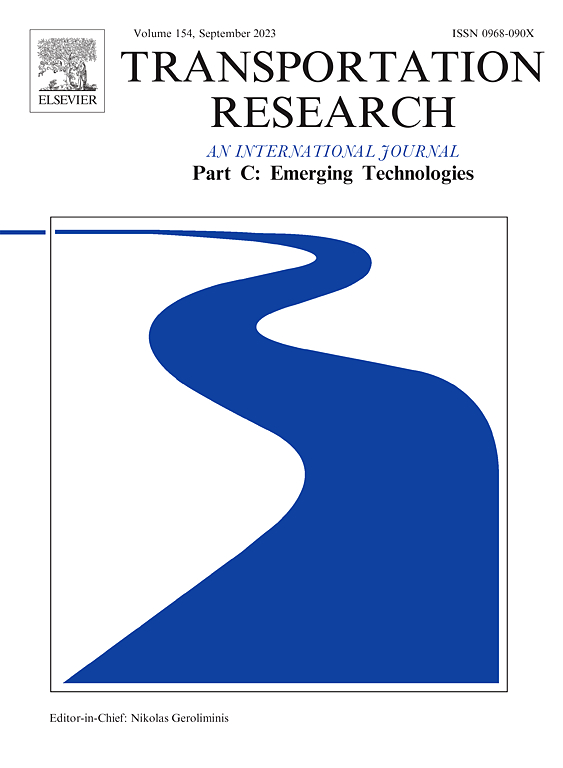Detecting shifts in urban rail passenger behavior during emergencies: A data-driven comparative approach
IF 7.6
1区 工程技术
Q1 TRANSPORTATION SCIENCE & TECHNOLOGY
Transportation Research Part C-Emerging Technologies
Pub Date : 2025-10-10
DOI:10.1016/j.trc.2025.105377
引用次数: 0
Abstract
During urban rail transit (URT) emergencies, passengers often modify their travel behavior in response to perceived risks and disruptions. Detecting and understanding these behavioral shifts is essential for evaluating the impacts of such events and designing effective contingency strategies. This paper proposes a data-driven approach to detect individual behavior changes by comparing observed behavior during emergencies with predicted normal behavior. To establish reliable references, we design a continuous rolling prediction pipeline that dynamically forecasts routine travel patterns, serving as counterfactual baselines for comparison. We validate our approach through a case study using data from Beijing’s URT system. Results demonstrate that the predictive module improves the accuracy of normal individual travel behavior predictions, and our data-driven approach effectively detects behavioral changes during emergencies. These findings offer valuable insights for understanding individual behavior variability, improving emergency planning, and forecasting passenger flow under crisis conditions.
探测突发事件中城市轨道交通乘客行为的变化:数据驱动的比较方法
在城市轨道交通(URT)突发事件中,乘客往往会根据感知到的风险和中断改变他们的出行行为。检测和理解这些行为变化对于评估此类事件的影响和设计有效的应急策略至关重要。本文提出了一种数据驱动的方法,通过比较紧急情况下观察到的行为与预测的正常行为来检测个体行为变化。为了建立可靠的参考,我们设计了一个连续滚动预测管道,动态预测日常出行模式,作为比较的反事实基线。我们通过使用北京轨道交通系统数据的案例研究验证了我们的方法。结果表明,预测模块提高了正常个人出行行为预测的准确性,我们的数据驱动方法可以有效地检测突发事件中的行为变化。这些发现为理解个体行为差异、改进应急计划和预测危机条件下的客流提供了有价值的见解。
本文章由计算机程序翻译,如有差异,请以英文原文为准。
求助全文
约1分钟内获得全文
求助全文
来源期刊
CiteScore
15.80
自引率
12.00%
发文量
332
审稿时长
64 days
期刊介绍:
Transportation Research: Part C (TR_C) is dedicated to showcasing high-quality, scholarly research that delves into the development, applications, and implications of transportation systems and emerging technologies. Our focus lies not solely on individual technologies, but rather on their broader implications for the planning, design, operation, control, maintenance, and rehabilitation of transportation systems, services, and components. In essence, the intellectual core of the journal revolves around the transportation aspect rather than the technology itself. We actively encourage the integration of quantitative methods from diverse fields such as operations research, control systems, complex networks, computer science, and artificial intelligence. Join us in exploring the intersection of transportation systems and emerging technologies to drive innovation and progress in the field.

 求助内容:
求助内容: 应助结果提醒方式:
应助结果提醒方式:


